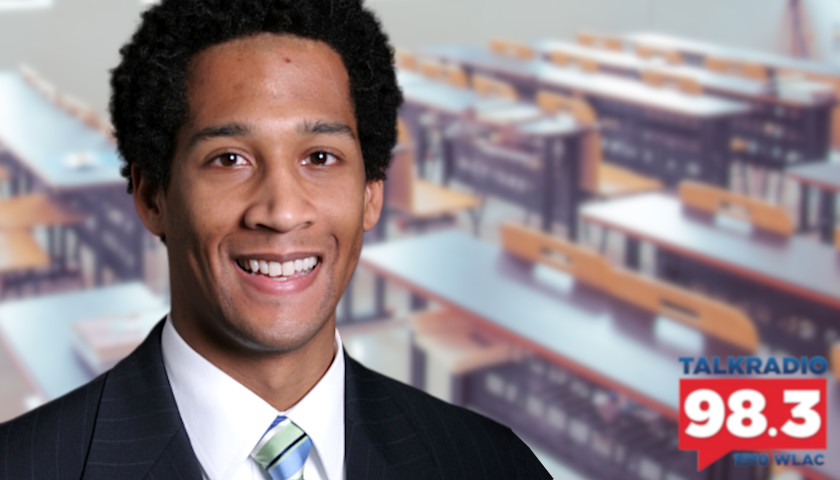Live from Music Row Wednesday morning on The Tennessee Star Report with Michael Patrick Leahy – broadcast on Nashville’s Talk Radio 98.3 and 1510 WLAC weekdays from 5:00 a.m. to 8:00 a.m. – host Leahy welcomed Tennessee Director of the American Federation for Children Shaka Mitchell to the newsmakers line.
During the third hour, Mitchell outlined the current lawsuit regarding Governor Lee’s education savings account pilot program that would enable parents and their students to attend the school of their choice in Davidson and Shelby counties. He informed that two weeks ago Lee had filed an appeal to the Tennessee Supreme Court and are expecting hearings to commence soon after the new year per the courts discretion.
Leahy: We are joined in the studio with the original all-star panelist Crom Carmichael. And on our newsmaker line our good friend Shaka Mitchell who is the Tennessee State Director for the American Federation for Children. There’s a lawsuit that you folks are involved in. Tell us about it Shaka.
Mitchell: Hey, good morning Michael Patrick. Thanks for having me. Yeah, this lawsuit which many of your listeners have heard about before. It’s all about Governor Lee’s new education savings account pilot program. And this is a program that would give eventually 15,000 low-income students in the Nashville and Memphis areas a chance to go to the school of their parents’ choice. Whether that’s a private school or a religious school or what have you. It would let those dollars follow the scholars.
Leahy: So walk us through this. The General Assembly passed this law back in early 2019. I think it was like May. Very controversial but it passed. It was signed by the governor. Tell us what the law would have done.
Mitchell: Sure. So the law passed back in May 2019. and what it would do is if you qualify for this program and it’s based on you know the household size and income. And then you have to be primarily zoned for one of the areas where you get the highest number of low-performing public schools.
So this is really targeted for families who don’t have a great neighborhood school option where they live. And if you qualify you can get the state dollars that follow your student and you can take them and they go into an account. You could go to a private school with them. You can use them for tutoring and expensive technology. And that works out to be about $7,000. per student per year.
Leahy: One of the criticisms of this law was that it was apparently, and tell me if I got this right, only applied to certain students in Shelby County and Davidson County. Do I have that right?
Mitchell: You got that right. Yeah. And this is a place where you know, the opponents of the law kind they are talking out of both sides of their mouth little bit because they say, on the one hand, well, they’ve asked the court to invalidate this program because it doesn’t apply to everybody.
But if you say to them hey, so do you want to go ahead where this was targeted as the pilot program or do you want to go ahead and just do it statewide tomorrow? And they’d say oh no, we don’t want to do that because that would expose, you know, the existing public school system and it would kind of uncover all of the warts that are there.
Carmichael: So the compromise in order to get it passed was to restrict it to students who are going to low-performing schools in just Davidson County and Shelby County now. And it’s because of those restrictions that the court ruled that the law is unconstitutional. Is that correct?
Mitchell: That’s essentially right. The lower courts said that because in the lower courts view, because this only applies to a “particular county” that this new program can’t stand. Now, you know, here’s the thing. The Tennessee General Assembly obviously didn’t know that a global pandemic was on its way. But this was amazing timing because just think about how many students could be helped right now if they had this program?
Kids in Nashville and in Memphis have been remote and have been you know on computers since March. They have not been in public schools. At least 5,000 of them right now could be in you know in school buildings getting an education that works for them. So we think you know, this is much more about hey, how do we help kids right now? We’re not talking about the definition of the word particular.
Leahy: Has the Tennessee Supreme Court decided to take up the appeal? I guess the state of Tennessee and the governor is the one appealing this? And you’ve joined as the Amicus brief on it?
Mitchell: That’s exactly right. So the governor has appealed to the Tennessee Supreme Court about two weeks ago. We joined that and we filed a brief. Our good friends at the Beacon Center are also representing some families in this lawsuit. There are other few firms that are representing families and schools that want to participate. Because you know at the end of the day for the other side this case is all about how do we keep control?
How do we keep money in these brick and mortar schools? For our side, I would say this is all about kids. How do we make sure schools are working for kids. And by the way here’s a stat for you. I don’t want to bore you with these but less than 17 percent of the kids who were targeted for this program were on grade level before the pandemic. Less than 17 percent. So it’s a pretty bad situation out there for a lot of kids.
Carmichael: Now I understand the argument for the judge’s ruling in terms of well, it only applies to children in two counties therefore it’s unequal. But are there precedents in other states where vouchers were targeted and not made available to everybody? Because that’s really what this is about.
Mitchell: Yeah. Yeah. That’s a great question. And so there absolutely are programs. In fact, some of the first voucher programs in the country only targeted one city. So you’ve got Milwaukee with one of the best-known programs. You have programs that target specific counties. You’ve got programs in Arizona that are designed for students in military families. You know, there are lots of ways that you can flip this.
We have one in Tennessee already that’s only for students who have special needs. So if you’re talking about the number of students across the state with special needs it’s actually a much smaller number of kids than the number of kids in Nashville and Memphis. So yeah, we think there’s a lot of precedents.
Leahy: When will the Supreme Court of Tennessee decide if they’ll take up the appeal?
Mitchell: Boy, you know Michael Patrick my 2020 magic ball has not been very good. (Leahy chuckles)
Leahy: None of us have been very good at predictions in 2020 I would say.
Mitchell: That’s right. My predictions are not very good this year. But I do believe and even the lower courts acknowledge that there is a lot at stake. Because you’ve got kids who had already signed up to use this program. So there’s a lot at stake. We’re hopeful that the courts will take the case quickly because if there’s a favorable ruling we got a lot of work to do to tell parents so that they can get signed up. Because honestly, we don’t know when schools are going to get ‘back to normal.’ And we want to make sure that whenever they go back it is not just back to normal that it’s better than normal.
Leahy: So the litigation will have an outcome one way or the other. It’s there any effort in the next session of the Tennessee General Assembly to bring up an additional bill that would expand the educational savings account program beyond the two pilot counties?
Mitchell: Yeah. Well, I don’t want to certainly do want to break confidence. But there is some talk about this. I mean, you know that there are many legislators who feel really passionately. And who frankly spent a lot of political capital making sure this got past the first time. They believe in it. They are student-centric lawmakers and policymakers. And we’re so thankful for them. I’ve heard Governor Lee say this was the thing that made him the proudest in his first two years. So I think there’s a desire to do this. Obviously, we want to see how it plays out in the courts. But ultimately we just want to do what’s best for students.
Carmichael: Now the supreme court of Tennessee will tell you whether they’re going to hear the case at some time in the relatively near future because they have to do that don’t they? You all have appealed or the governor has appealed to the state supreme court. They can’t just rope-a-doping say nothing. So it has to either say we’re going to take it or say we’re not going to take it fairly soon, correct?
Mitchell: That’s correct. I anticipate that they would make a decision about whether or not they’ll take the case. Who knows. It could get that decision even before the calendar year before the months over. And then it would be a matter of them setting argument dates and hearing dates kind of early in the new year. But it could all happen pretty quickly. But again, it’s the court’s prerogative.
Carmichael: Well, I can’t imagine a court case that matters more especially to families that are trapped in school districts where the schools are vastly underperforming. So it certainly is my hope that the state supreme court not only takes up the case but also rules in favor of the law and to let at least 5,000 kids have a chance at a quality education.
Mitchell: I totally agree with you. I think it would make for a great Christmas present. Absolutely.
Leahy: Shaka Mitchell, the Tennessee state director for the American Federation for Children. Thanks so much for joining us and come back again soon and give us a report on how that case goes before the Tennessee Supreme Court.
Mitchell: Absolutely. Merry Christmas.
Leahy: Merry Christmas! We get to say that here.
Listen to the third hour here:
– – –
Tune in weekdays from 5:00 – 8:00 a.m. to the Tennessee Star Report with Michael Patrick Leahy on Talk Radio 98.3 FM WLAC 1510. Listen online at iHeart Radio.
Photo “Shaka Mitchell” by Shaka Mitchell.








